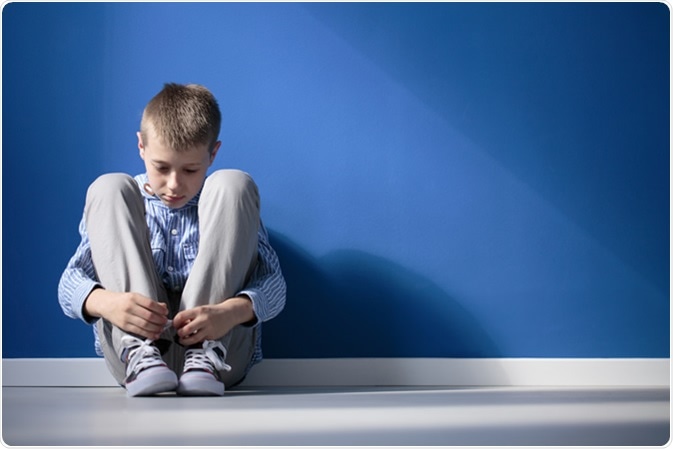A phobia is a condition in which an individual suffers from intense fear of an object or situation that lasts for a prolonged period of time and has no rational cause. It may also be defined as the emergence of an unwanted fear relating to a particular situation, incident, or objects. Phobias are a type of anxiety disorder. Children who suffer one or more phobias constantly have anxiety. The most common phobias comprise a fear of heights, public interaction, blood, insects, or animals.

Types of Phobias
Phobias are common to both children and adults. Some phobias that arise during childhood resolve spontaneously as the child grows, while others may persist. Some important phobias that affect children are as follows:
- Agoraphobia: In this state the child feels anxious when entering an open space
- Panic disorder: A sudden occurrence of fear or nervousness that leads to a rapid and distressing increase in the heart beat
- Specific phobias: Conditions in which the child is afraid of certain objects or places
- Separation anxiety disorder: This is a condition where children are afraid of being separated from their loved ones (father, mother, siblings, or caregiver)
- Selective mutism: In this state the child is nervous or afraid to speak in front of a public gathering such as at a cultural event or contest
- Social anxiety disorder: In this disorder, children compare themselves with other children and conclude that they are less worthy or useless, becoming extremely shy and incapable of interacting with others outside their homes
Causes of Phobia in Children
Research has found that the causes of phobia lie in different elements such as biological, family, and environmental factors.
- Biological Causes: Chemicals called neurotransmitters play a vital role in transmitting messages to and from the brain, and controlling the feelings of a person. When the levels of important neurotransmitters such as dopamine and serotonin are affected, they can become a cause of anxiety.
- Family or Genetic Factors: Like the color of hair, eyes, and skin, the child has a tendency to inherit a genetic predisposition to fear from his parents. Children are influenced by the people around them; if a person is stressed or anxious the child tends to develop the same feelings. For instance, if a parent of the child has a fear of cockroaches, then there is a high possibility for the child to develop the same.
- Environmental factors: Environmental factors may trigger the development of phobias in children, such as a traumatic event. For children, it might be a common situation like going to school after a long vacation that results in heightened anxiety.
Common Age-Related Fears
- 2–4 years: Children of this age fear loud noises, sounds made by animals, toilets and bathrooms, ghosts, disabled people, death, and sometimes being alone.
- 4–6 years: Children of this age group usually fear darkness. They are also capable of imagining frightening creatures or ghosts and worrying that these characters may disturb them. Meeting strangers is a huge stress for such children, and this can create a lot of stress. Other fears include anxiety about losing one’s parents, about the death of a family member, or becoming injured.
- 8 years: These children might complain of simple and common fears such as the fear of social rejection, shifting to a new place to live, having to go to school or being late. They may also constantly worry about personal danger.
- 9–10 years: These children are pre-teens. They may fear that their parents will separate or divorce, or fear that they may have to face danger in their life. This commonly manifests as fear of blood and meeting with injuries.
- 11–12 years: Frequently, these children think that they might be kidnapped. Being alone or in a dark place also creates severe anxiety in these children. Boys in this age group usually lose much of their fearfulness steadily.
- 13 years: These children have all the common fears that younger children have. However, they also frequently seem to have a fear of heights.
- 14–16 years: As these teenagers are more mature, compared to their younger counterparts, their fears take other forms, such as unreasonable fear of being in car accidents, plane crashes, terrorist attacks, fear of infections, fear of sexual relations, and fear of talking in public or in a crowd.
Some young children have the habit of imagining a nonliving object to be a living thing. This imaginary being becomes the basis for fears. They imagine that the fictional creature is dangerous and may harm them in some way. If they constantly feed their imagination, they may even begin to behave like their creature.
In children, diagnosis of anxiety disorder or phobia is made after a comprehensive medical and psychiatric examination. It may be rather difficult to diagnose these conditions. Parents have the tremendous responsibility of identifying excessive or constant feelings of anxiety in their children at the early stages and to address it themselves, or to seek professional help if the child does not respond properly. Early diagnosis and treatment can go a long way in helping children to recover completely, and avoid further psychological problems in their adult life.
References
- http://www.stanfordchildrens.org/en/topic/default?id=phobias-in-children-and-adolescents-90-P01639
- http://www.childrenshospital.org/conditions-and-treatments/conditions/phobias/symptoms-and-causes
- https://www.clinical-partners.co.uk/child-adolescents/a-z-of-issues/teenage-and-child-anxiety-support/childhood-phobias
- https://childmind.org/guide/specific-phobia/
- https://www.nopanic.org.uk/childrens-fears/
- https://www.bu.edu/card/get-help/child-programs/child-conditions/specific-phobias-child/
Further Reading
- All Phobia Content
- What is a Phobia?
- Causes of Phobias
- Types of Phobias
- Diagnosis of Phobias
Last Updated: Aug 23, 2018

Written by
Dr. Liji Thomas
Dr. Liji Thomas is an OB-GYN, who graduated from the Government Medical College, University of Calicut, Kerala, in 2001. Liji practiced as a full-time consultant in obstetrics/gynecology in a private hospital for a few years following her graduation. She has counseled hundreds of patients facing issues from pregnancy-related problems and infertility, and has been in charge of over 2,000 deliveries, striving always to achieve a normal delivery rather than operative.
Source: Read Full Article